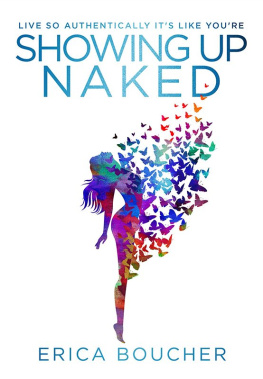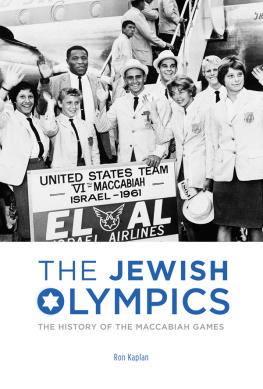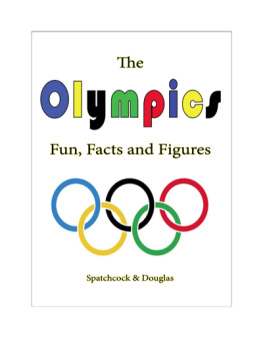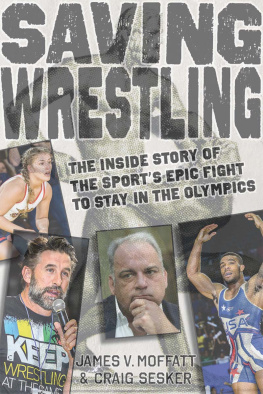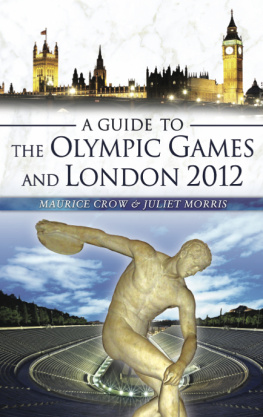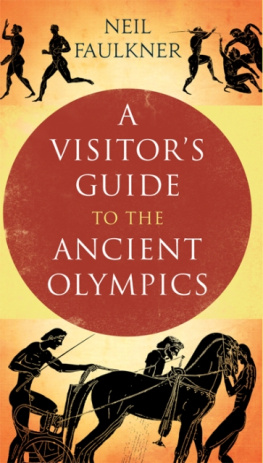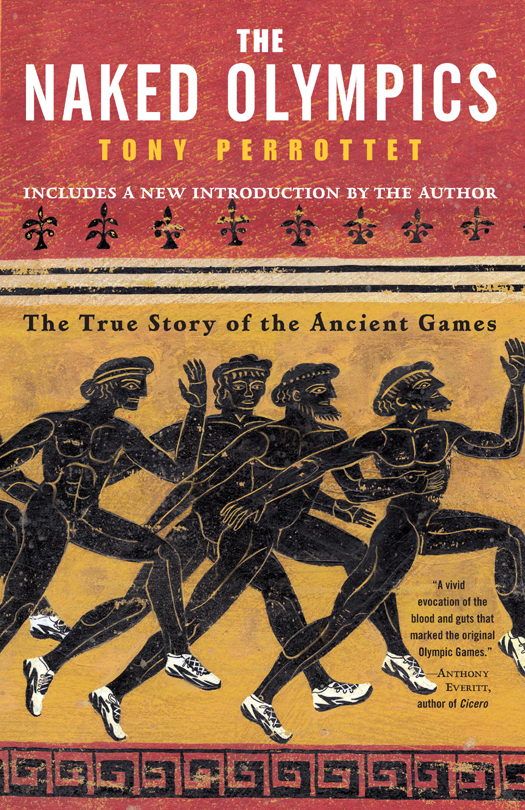
THE NAKED OLYMPICS
THE TRUE STORY OF THE ANCIENT GAMES
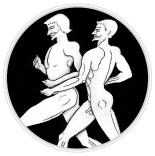
ILLUSTRATIONS BY LESLEY THELANDER
TONY PERROTTET

RANDOM HOUSE TRADE PAPERBACKS
NEW YORK
2004 Random House Trade Paperback Original
Text copyright 2004, 2012 by Tony Perrottet
All rights reserved under International and Pan-American Copyright Conventions. Originally published in the United States in trade paperback and in slightly different form by Random House Trade Paperbacks, an imprint of The Random House Publishing Group, a division of Random House, Inc., in 2004. and simultaneously in Canada by Random House of Canada Limited, Toronto.
RANDOM HOUSE TRADE PAPERBACKS and colophon are trademarks of Random House, Inc.
Film stills from Olympia, Ben-Hur, and The 300 Spartans are reproduced courtesy of Photofest.
Photographs on pages 4, 5, and 66 copyright 2004 by Tony Perrottet
Illustrations are by Lesley Thelander and are reproduced courtesy of the illustrator.
Library of Congress Cataloging-in-Publication Data
Perrottet, Tony.
The naked Olympics: the true story of the ancient games / Tony Perrottet.
p. cm.
1. Olympic games (Ancient) I. Title.
GV23.P47 2004 796.48dc22 2003066728
Random House website address: www.atrandom.com
eISBN: 978-1-58836-382-4
Cover design: Robbin Schiff
Cover illustration: Philippe Lardy
v3.1
If the Olympic Games were being held right now, you would see why we Greeks attach such paramount importance to athletics. Oh, I cant describe the scene in mere words. You really should experience firsthand the incredible pleasure of standing in that cheering crowd, admiring the athletes courage and good looks, their amazing physical conditioningtheir great skill and irresistible strengthall their bravery and their pride, their unbeatable determination, their unstoppable passion for victory!
I know that if you were there in the Stadium, you wouldnt be able to stop applauding.
LUCIAN, Anacharsis, C. A.D. 140

Acknowledgments
THE STUDY OF the ancient Olympics is a crowded field, and one that I entered with some hesitation. Ever since the Victorian era, when modern interest in athletics was revived, scholars have pored over every detail of Greek physical culture. (Energetic dons at British universities even took to the arenas with handmade discuses and practiced running naked to see if it improved speed.) The volume of scholarship has only increased with the popularity of the modern Olympics, reborn in 1896 in Athens. Was it possible to say something fresh about a subject that invites a new spate of books every fourth year?
But reading through the voluminous literature, I realized that most serious works on the Olympics maintained a very narrow (and often excruciatingly dry) focus. Nobody had tried to re-create the ancient Games in their sprawling, human entiretyas the ultimate pagan festival, a mass gathering where the Greeks favorite sports were combined with religious ceremonies and every possible ancient entertainment. To answer my own central questionWhat was the actual experience of attending this extravaganza?I would need to write a different book. So I decided to approach the Games day by day, step by step, weaving together the strands of evidence to recapture what it was like to be a part of the ancient Olympics as a spectator, an athlete, or one of the overworked officials.
Naturally, this excursion into antiquity could not have been written without the help of many people.
I would particularly like to thank Dr. David Gilman Romano, senior researcher at the Mediterranean section of the University of Pennsylvania, for generously providing his time and advice. As both a classicist and a former track champion, he is uniquely qualified to connect ancient evidence with actual practice, and bring Greek sports to life. Of the many fine scholars working in the field, I must acknowledge a debt above all to James Davidson and Lionel Casson for their groundbreaking works on daily life in the ancient era, and to Stanley Lombardo for his luminous translation of Homer.
In Greece, while I was researching at ancient Olympia itself, Dr. Helmut Kyrieleis of the German Archaeological Institute very kindly showed me around the recent excavations and helped interpret many puzzling aspects of the site, while the experts Frank and Patricia, raising a column of the Temple of Zeus, kindly invited me to their home for dinner, providing the only square meal I had in modern Olympia, one of Greeces more mercenary service towns.
I would also like to offer my thanks to my excellent editor, Susanna Porter, for her ongoing encouragement and perceptive advice on the manuscript; her assistant, Evelyn OHara, who brought the strands of text and artwork seamlessly together; the inspired art director Robbin Schiff; my energetic agent, Elizabeth Sheinkman; and Rob Weissman, for his enthusiastic support and advice on modern athletics.
Of course, my broadest debt is to my wife, Lesley Thelander, who helped nurse this book from its earliest drafts; without her patient assistance, detailed editing, and regular infusions of humor, it would have remained a formless mass. Thanks finally to budding pentathlete Henry Perrottet, who kept me suitably fit while writing about ancient sports by running me ragged around the playgrounds of Manhattan and beaches of Sydney.

Contents

List of Illustrations

Introduction: From Olympia to London
GREEK PATRIOTS MAY look askance at London hosting its third Olympic Gamesthe only world city to do so in modern times, in 1908, 1948, and now 2012while the land of the events ancient origins has hosted it only twice, in Athens in 1896 and 2004. The more vocal Greek nationalists have described it as an act of historical larceny on a par with the theft of the Elgin Marbles, the sculptures that once graced the Parthenon and now languish in the British Museum. On one level, the resentment is understandable. As this book demonstrates, the classical Games were the greatest emblem of Hellenic culture for nearly eleven centuries, from 776 B.C . to 393 A.D . But the modern revival of the Olympics in 1896, after a 1,500-year hiatus, is not a black-and-white tale of a Greek ritual simply being pilfered. In fact, the nineteenth-century revival might never have occurred without the efforts of the British, particularly a group of eccentric upper-crust Victorians who were obsessed with sports, the classics, and the idealized male form in Greek art.


